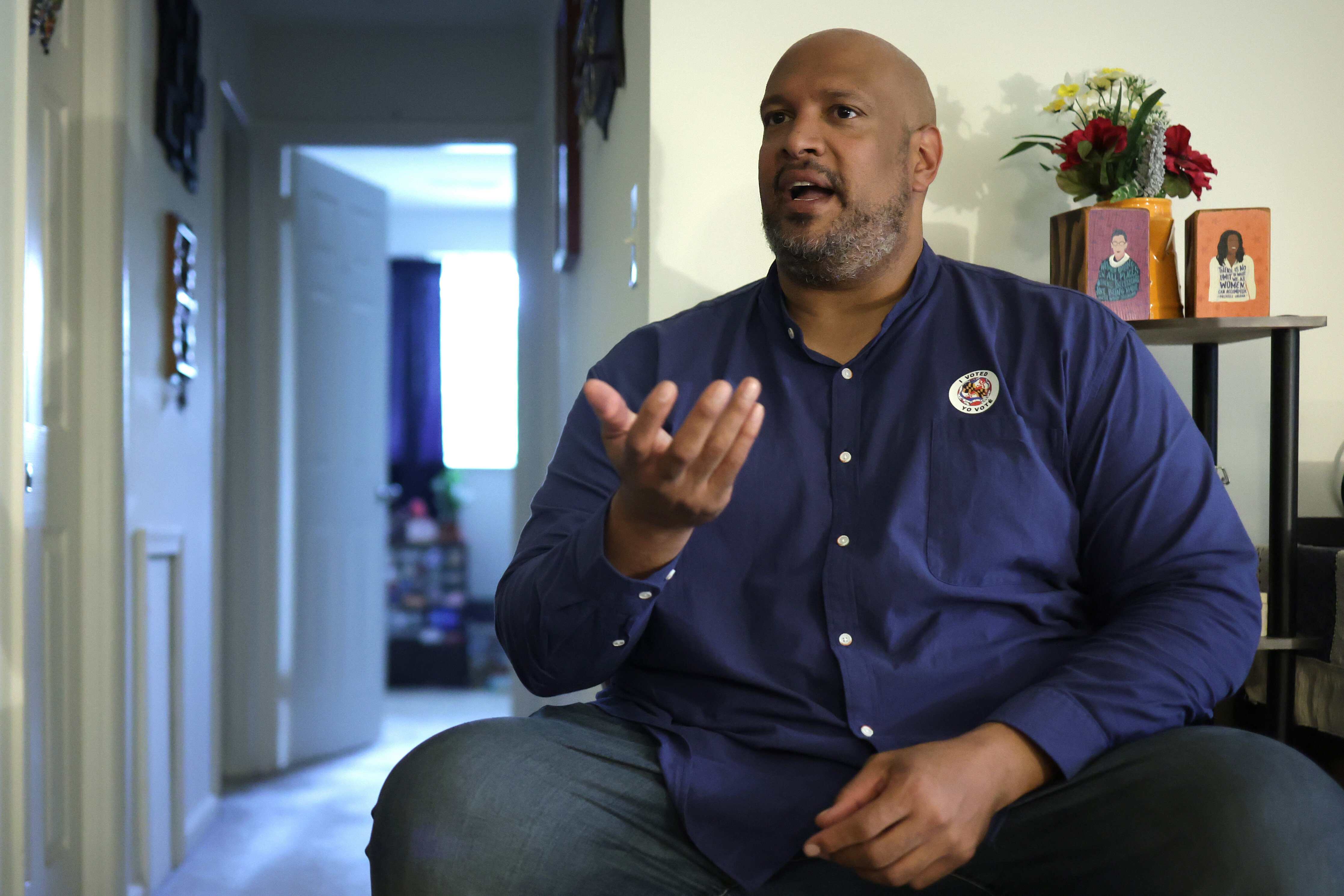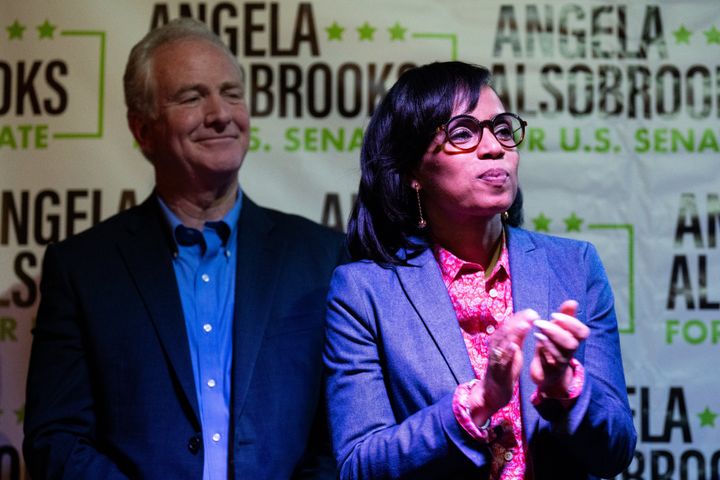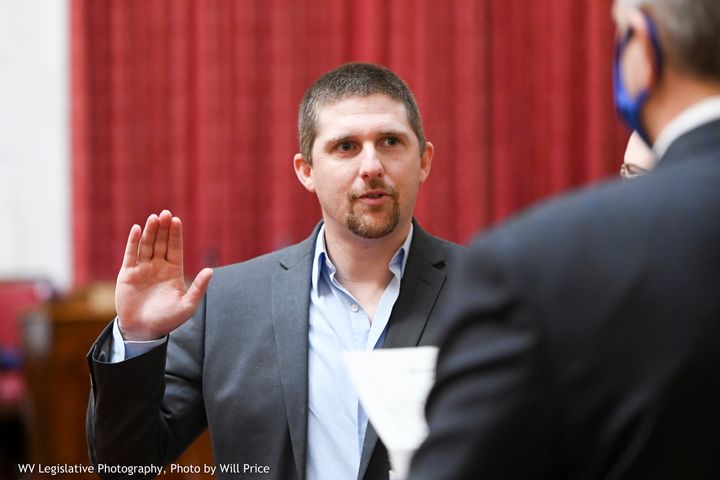
Everything was going according to plan for Harry Dunn, a former U.S. Capitol police officer running for the Democratic nomination in Maryland’s open 3rd Congressional District.
A hero to Democrats for his role defending the Capitol from a pro-Donald Trump mob on Jan. 6, 2021, Dunn was out-fundraising a crowded field of opponents in the race to succeed retiring Rep. John Sarbanes in the Baltimore and Washington suburbs.
Then, in early April, the American Israel Public Affairs Committee’s super PAC, United Democracy Project, began spending heavily for one of Dunn’s opponents, state Sen. Sarah Elfreth.
Dunn had produced an Israel policy position paper in line with AIPAC’s agenda, ruling out, for example, new conditions on U.S. aid to Israel. But UDP insisted that Elfreth was the best choice to defeat other “serious anti-Israel candidates” in the race. UDP has since spent more than $4.2 million on Elfreth’s behalf, positioning her for a strong showing in the state’s primaries Tuesday.
AIPAC’s involvement — at a time when Israel’s invasion of Gaza has created a rift within the Democratic Party — has given the race the feel of an ideological proxy battle.
At the end of April, the political arm of J Street, a progressive pro-Israel group, endorsed Dunn, citing the “flood of right-wing dark money in this race under a supposedly ‘pro-Israel’ banner.”
Last week, the Congressional Progressive Caucus PAC endorsed Dunn as well, citing his support for “Medicare for All” and opposition to corporate money in politics.
“He was the only candidate in this race with a path to victory that was consistent on those progressive priorities and wanted to be a part of the caucus.”
- Evan Brown, Congressional Progressive Caucus PAC
“He was the only candidate in this race with a path to victory that was consistent on those progressive priorities and wanted to be a part of the caucus,” said Evan Brown, executive director of the CPC PAC.
But for those hoping that AIPAC’s barrage against Dunn has nudged him to the left on U.S.-Israel policy, prepare for disappointment.
While Dunn has railed against AIPAC’s spending as an example of money in politics run amok, and blasted the group for endorsing “insurrectionist” Republicans who objected to the certification of the 2020 election results, he has not said as much about their policy priorities. And when asked whether he supports Biden’s decision to halt a weapons shipment to Israel — and threaten more if Israel engages in a full-scale invasion of Rafah — Dunn declined to answer.
“I’m not a member of Congress, and I haven’t seen intelligence on the security situation in the Middle East or the state of negotiations,” Dunn said in a statement to HuffPost. “I believe everything the United States does right now has to be laser-focused on ending this war, delivering aid, and bringing all of the hostages home who were brutally abducted by Hamas.”
Elfreth’s campaign did not respond to a request for comment on her position.
Still, the Democratic primary winner in Maryland’s 3rd, who is virtually assured to represent the seat in Congress, given the district’s heavy Democratic tilt, has implications for the institutional balance of power in Washington.
A win for Dunn, who is now unlikely to affiliate with AIPAC, is a blow to AIPAC in a race where the policy and ideological stakes were unclear. And a win for Elfreth would attest to the strength of AIPAC cash, even against a grassroots favorite like Dunn.
Here are four other races to watch in Maryland and West Virginia on Tuesday:

A Black Woman Comes Up Against A Wall Of Money
Maryland Sen. Ben Cardin’s forthcoming retirement has created a coveted opportunity for Democratic up-and-comers in the liberal Old Line State to ascend to Congress’ upper chamber.
The race pits Prince George’s County Executive Angela Alsobrooks, who would be Maryland’s first Black senator, against U.S. Rep. David Trone, a co-founder of the multibillion-dollar liquor chain Total Wine & More who has poured a whopping $61 million into the race.
The contest between Trone and Alsobrooks, both mainstream Democrats, is less ideological than it is personal. Alsobrooks has the support of EMILY’s List, which backs pro-choice Democratic women, Sen. Chris Van Hollen, Maryland Gov. Wes Moore, and a host of state and local elected officials. Alsobrooks is loath to make the race about identity, but her allies are happy to characterize the primary as a fight between a barrier-breaking woman of color and a wealthy white man buying his seat. To the extent that there are policy differences between the two candidates, an anti-monopoly group has argued that Total Wine’s predatory behavior to local small businesses speaks volumes about Trone’s sympathies for big business.
Trone, by contrast, touts his ability to self-fund as a major advantage in the general election. Maryland is ordinarily not competitive in Senate elections, but Republicans have nominated former two-term Gov. Larry Hogan, who left office in 2023 with high approval ratings. An Emerson College poll last week showed both Trone and Alsobrooks defeating Hogan in a head-to-head matchup, but some Democrats still see Trone’s fortune as an asset in an election cycle when national Democrats would rather not expend resources in a blue state like Maryland.
The same Emerson College poll incidentally showed Alsobrooks with a narrow lead over Trone, suggesting his massive spending advantage may not prove decisive.

A Jan. 6 Felon Challenges A Pro-Trump Incumbent
Ruby-red West Virginia’s GOP primaries on Tuesday provide voters choices between staunchly pro-Trump Republicans and somehow even more hardcore pro-Trump Republicans.
The clearest example of this phenomenon is likely in West Virginia’s 1st Congressional District, which includes the capital city of Charleston, as well as the state’s coal region in the south.
Rep. Carol Miller, a Donald Trump ally who voted against certifying the 2020 election, faces a primary challenge from Derrick Evans, who served three months in prison for his participation in the Jan. 6, 2021, assault on the U.S. Capitol. Evans, who had just been sworn in as a state delegate, had livestreamed his entry into the Capitol on Facebook, prompting federal charges almost immediately. He resigned his legislative post and later pleaded guilty to felony civil disorder.
Evans, who makes a living as a real-estate investor, is now selling MAGA voters on his credentials as a “Jan. 6 political prisoner” victimized for peaceful protest. His charges against Miller include her meeting with billionaire Bill Gates, an opponent of the coal industry, during his visit to West Virginia.
Evans’ endorsements from right-wing Rep. Bob Good and the hardened fringe of MAGA influencers — former national security adviser Michael Flynn, MyPillow founder Mike Lindell, and former Trump adviser Roger Stone — have undoubtedly helped him amass a decent fundraising haul, even as Miller has outspent him. An October poll showed Evans narrowing Miller’s lead to 12 percentage points.
In a district Trump carried by more than 40 percentage points, the winner on Tuesday is the prohibitive favorite to capture the seat in November.

The Transphobic Trainwreck
Term-limited West Virginia Gov. Jim Justice (R) is running for U.S. Senate and the race to replace him has spawned an ugly war of words among GOP contenders competing for the title of most anti-trans-rights nominee.
State Attorney General Patrick Morrisey, former state Del. Moore Capito, and car dealership owner Chris Miller have been taunting each other nonstop for alleged squishiness in the fight against transgender rights. Another top contender, West Virginia Secretary of State Mac Warner, has bypassed the hot-button topic in favor of other issues.
One choice example in the bigoted battle is an ad by a pro-Morrissey group depicting Miller in a blond, feminine wig. “Chris Miller protected they/them, not us,” the ad concludes.
The focus on trans rights is curious in West Virginia, where Republicans have a supermajority in the state legislature. The state has already banned transgender minors from obtaining hormone therapy, puberty blockers, or gender reassignment surgery. The state has also prohibited transgender youth from playing on sports teams that match their gender, though Morrisey has been struggling in court to allow the ban to take effect amid court challenges.
In a recent public poll, Morrissey led the pack, followed by Miller, Capito and Warner. Capito is the son of U.S. Sen. Shelley Moore Capito and Miller is the son of Rep. Carol Miller.

The Latino Gen Z Contender Takes On The Self-Funding Former Congressman’s Spouse
When Maryland Del. Joe Vogel announced his campaign for Congress just over a year ago, he presented it as a chance for voters in Maryland’s 6th Congressional District to make history by sending only the second member of Generation Z to Capitol Hill.
Vogel, 27, who is Jewish and openly gay, immigrated to the United States as a young boy and quickly became involved in politics. He took office in the Maryland state House at age 25.
Unfortunately for Vogel, April McClain Delaney, an attorney who served as deputy assistant secretary of commerce in the Biden administration, jumped into the race in October, instantly making the primary fiercely competitive. Crucially, Delaney is married to John Delaney, a multi-millionaire financial services entrepreneur who represented Maryland’s 6th from 2013 to 2019 and mounted an unsuccessful presidential campaign for 2020.
Thanks to the couple’s shared fortune, April McClain Delaney has been able to lend her campaign $1 million of her nearly $2 million haul, providing her a critical edge over Vogel, who had raised less than $700,000 as of the end of April.
Delaney’s experience working for Biden won her the endorsement of the Washington Post editorial board.
Vogel has tried to make the race a referendum on Delaney’s personal wealth, status as the former congressman’s wife, and friendship with prominent conservatives like Supreme Court Chief Justice John Roberts. Delaney would be the third straight super-rich Democrat to represent the seat that stretches from affluent Washington suburbs to the state’s western panhandle. (Trone, the liquor magnate self-funding his Senate bid, succeeded John Delaney in Maryland’s 6th.)
Vogel has gotten some help in this task from an LGBTQ+ super PAC and some other outside groups.
But Delaney’s moderate profile and ability to self-fund are evidently a draw for some Democrats fearful of letting what was once a swing seat slip through the party’s grasp with the wrong nominee. Thanks to its rural portion, Biden carried Maryland’s 6th by just under 10 percentage points in 2020.
“We’re down by two seats right now in the House of Representatives,” progressive Rep. Jamie Raskin (D-Md.) said at an event in support of Delaney covered by The Washington Post. “Every seat counts.”
Disclaimer: The copyright of this article belongs to the original author. Reposting this article is solely for the purpose of information dissemination and does not constitute any investment advice. If there is any infringement, please contact us immediately. We will make corrections or deletions as necessary. Thank you.
